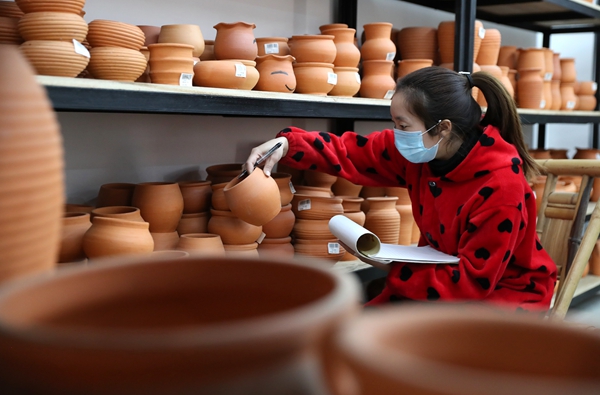Crafting a revival
China Daily,April 28, 2020 Adjust font size:
An employee from a Longyao clay pottery workshop in Pengzhou, Sichuan province, checks the items. The heritage workshop resumed production in March. [Photo provided to China Daily]
Traditional-art workshops resume production and alleviate poverty, Yang Feiyue reports.
The women's feet bobbed on the pedals of the sewing machines at the Jinpan Embroidery Workshop in Qinghai province's Huzhu Tu autonomous county in Haidong city in early April.
They were making complex traditional local embroidery, featuring bright colors and distinctive patterns.
In mid-March, the workshop resumed making local Qing embroidery, which was named as a national-level intangible cultural heritage in 2016.
It has long been one of China's most influential ethnic art forms and represents Tibetan farming culture.
And Qing embroidery has found interest in such countries as the United States, France and Japan.
It has played an important role in the county's poverty alleviation.
Mothers have passed the traditional skill to their daughters for generations over centuries.
Jinpan has received more than 2,000 orders since business resumed. About 300 ethnic Tu women are producing the items.
All of Qinghai's Qing embroidery businesses have reopened since late March, the provincial culture and tourism department says.
The sector employs over 3,000 low-income locals.
Xi Jinhua has earned more than 8,000 yuan ($1,140) over the past two months. She works for Sulonggu Embroidery Co, another workshop in Qinghai.
"Embroidery skills have opened a door to wealth for us," the 50-year-old says.
She earned over 40,000 yuan embroidering last year.
Sulonggu Embroidery general manager Su Xiaoli says: "We didn't stop production during the epidemic."
Su's company had local women make products at home during the outbreak.
It has since received over 20,000 orders from Singapore and South Korea. Embroidered goods, including facemasks, sachets and costumes, remain in demand.
Many intangible cultural heritage workshops across the country have resumed work and helped people living in poverty increase their incomes amid the epidemic.
The Ministry of Culture and Tourism and the State Council Leading Group Office of Poverty Alleviation and Development recently issued guidelines that support the founding of such workshops to create job opportunities and teach traditional art skills to people who are overcoming poverty.
The country hosts 2,300 heritage workshops that provide more than 460,000 jobs, the Ministry of Culture and Tourism says.
Many have resumed operation.
Over 30 workers have been hammering iron into broadswords in Linxia Hui autonomous prefecture in northwestern China's Gansu province.
"Most of our employees live in relatively tough circumstances," fifth-generation Bonan broadsword blacksmith Magazhuma tells China Tourism News.

361585b7-57d9-4e46-8550-e50bfe1bc7da.jpeg)